Key Challenges in Studying Psychology: An Online Discussion Forum
VerifiedAdded on 2023/04/25
|6
|1423
|243
Discussion Board Post
AI Summary
This discussion board post delves into the key challenges students face when studying psychology, emphasizing the complexities of understanding psychological disorders due to the absence of definitive symptoms and the variability of individual experiences. It highlights the difficulty in predicting patient behavior due to dynamic human traits and the impact of individual differences, such as genetic, environmental, socio-economic, and cultural factors. The post also addresses the challenge of comprehending overlapping factors and the role of unconscious processes in influencing psychological behavior. Furthermore, it includes responses to peer discussions, emphasizing the benefits of online education, such as accessibility, cultural diversity, and staying updated with scientific discoveries. The author shares personal motivations for pursuing an online psychology course, acknowledging potential research challenges while expressing excitement about acquiring new skills. The post references various academic sources to support its arguments.
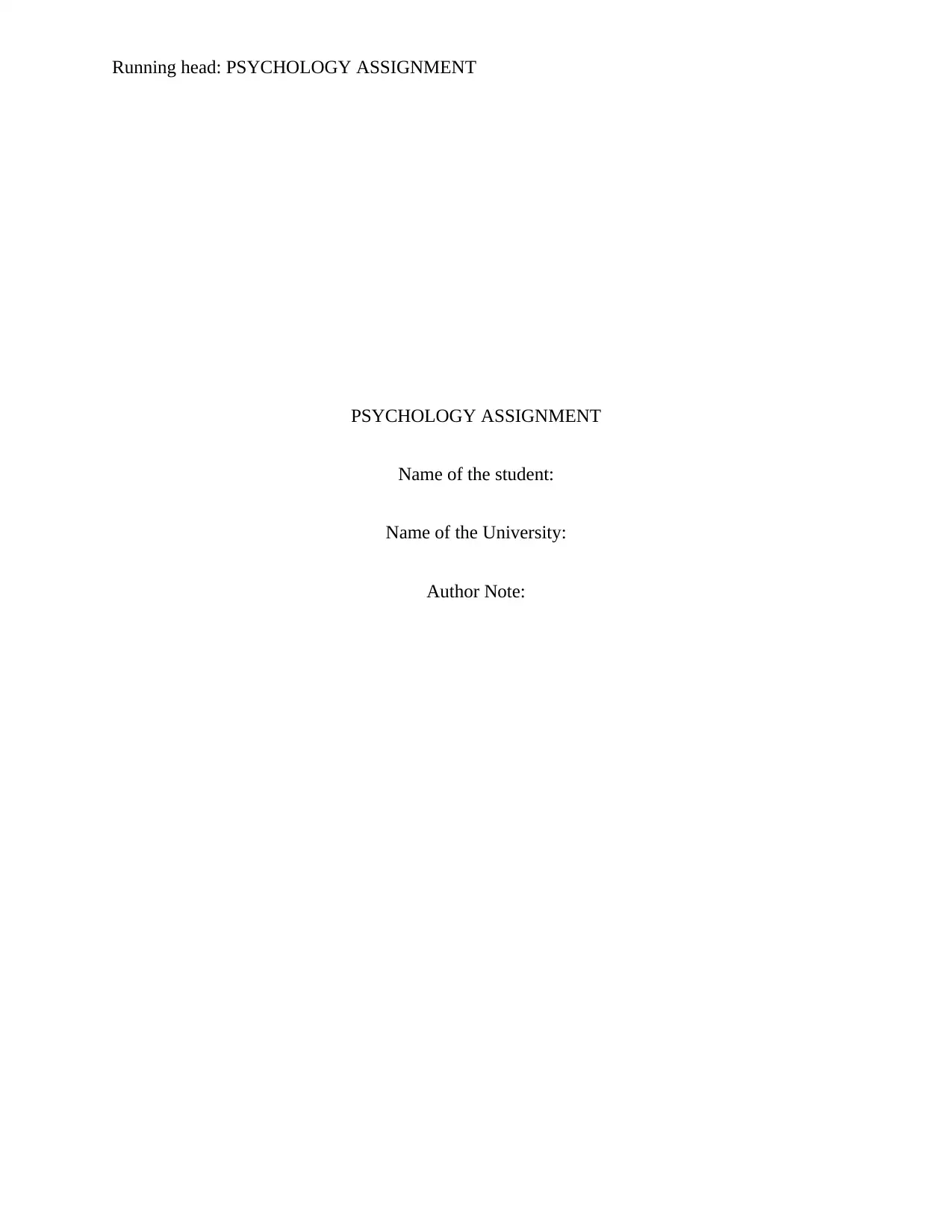
Running head: PSYCHOLOGY ASSIGNMENT
PSYCHOLOGY ASSIGNMENT
Name of the student:
Name of the University:
Author Note:
PSYCHOLOGY ASSIGNMENT
Name of the student:
Name of the University:
Author Note:
Paraphrase This Document
Need a fresh take? Get an instant paraphrase of this document with our AI Paraphraser
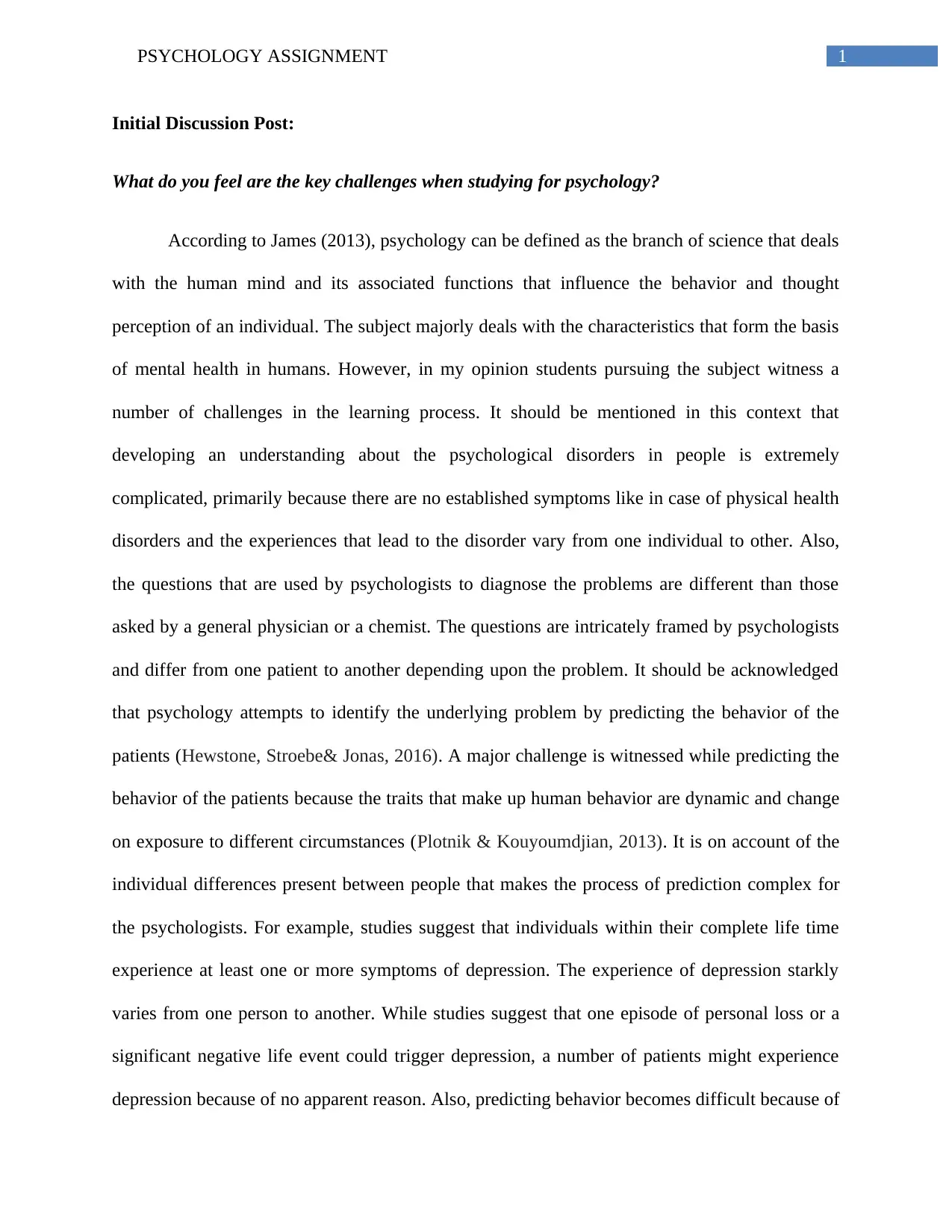
1PSYCHOLOGY ASSIGNMENT
Initial Discussion Post:
What do you feel are the key challenges when studying for psychology?
According to James (2013), psychology can be defined as the branch of science that deals
with the human mind and its associated functions that influence the behavior and thought
perception of an individual. The subject majorly deals with the characteristics that form the basis
of mental health in humans. However, in my opinion students pursuing the subject witness a
number of challenges in the learning process. It should be mentioned in this context that
developing an understanding about the psychological disorders in people is extremely
complicated, primarily because there are no established symptoms like in case of physical health
disorders and the experiences that lead to the disorder vary from one individual to other. Also,
the questions that are used by psychologists to diagnose the problems are different than those
asked by a general physician or a chemist. The questions are intricately framed by psychologists
and differ from one patient to another depending upon the problem. It should be acknowledged
that psychology attempts to identify the underlying problem by predicting the behavior of the
patients (Hewstone, Stroebe& Jonas, 2016). A major challenge is witnessed while predicting the
behavior of the patients because the traits that make up human behavior are dynamic and change
on exposure to different circumstances (Plotnik & Kouyoumdjian, 2013). It is on account of the
individual differences present between people that makes the process of prediction complex for
the psychologists. For example, studies suggest that individuals within their complete life time
experience at least one or more symptoms of depression. The experience of depression starkly
varies from one person to another. While studies suggest that one episode of personal loss or a
significant negative life event could trigger depression, a number of patients might experience
depression because of no apparent reason. Also, predicting behavior becomes difficult because of
Initial Discussion Post:
What do you feel are the key challenges when studying for psychology?
According to James (2013), psychology can be defined as the branch of science that deals
with the human mind and its associated functions that influence the behavior and thought
perception of an individual. The subject majorly deals with the characteristics that form the basis
of mental health in humans. However, in my opinion students pursuing the subject witness a
number of challenges in the learning process. It should be mentioned in this context that
developing an understanding about the psychological disorders in people is extremely
complicated, primarily because there are no established symptoms like in case of physical health
disorders and the experiences that lead to the disorder vary from one individual to other. Also,
the questions that are used by psychologists to diagnose the problems are different than those
asked by a general physician or a chemist. The questions are intricately framed by psychologists
and differ from one patient to another depending upon the problem. It should be acknowledged
that psychology attempts to identify the underlying problem by predicting the behavior of the
patients (Hewstone, Stroebe& Jonas, 2016). A major challenge is witnessed while predicting the
behavior of the patients because the traits that make up human behavior are dynamic and change
on exposure to different circumstances (Plotnik & Kouyoumdjian, 2013). It is on account of the
individual differences present between people that makes the process of prediction complex for
the psychologists. For example, studies suggest that individuals within their complete life time
experience at least one or more symptoms of depression. The experience of depression starkly
varies from one person to another. While studies suggest that one episode of personal loss or a
significant negative life event could trigger depression, a number of patients might experience
depression because of no apparent reason. Also, predicting behavior becomes difficult because of
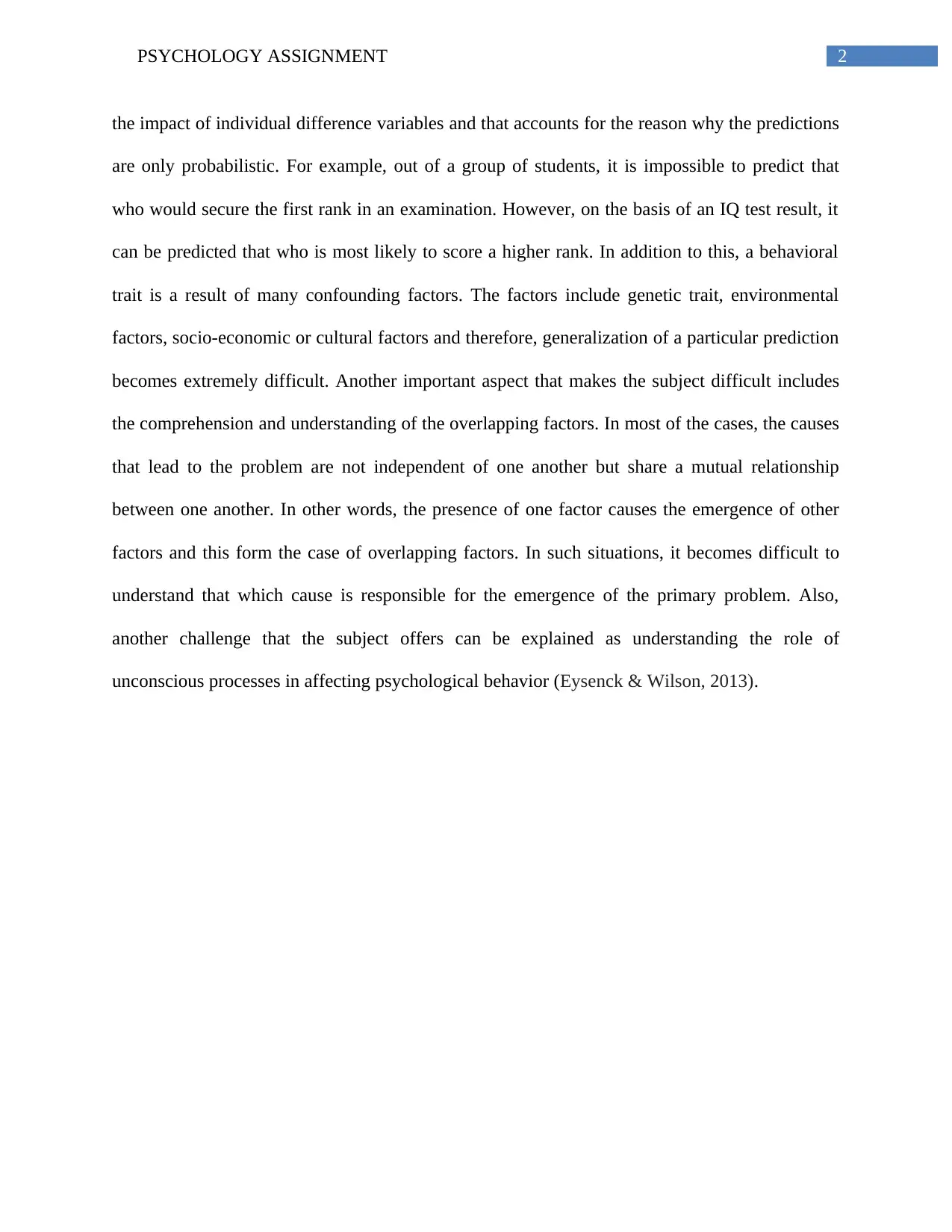
2PSYCHOLOGY ASSIGNMENT
the impact of individual difference variables and that accounts for the reason why the predictions
are only probabilistic. For example, out of a group of students, it is impossible to predict that
who would secure the first rank in an examination. However, on the basis of an IQ test result, it
can be predicted that who is most likely to score a higher rank. In addition to this, a behavioral
trait is a result of many confounding factors. The factors include genetic trait, environmental
factors, socio-economic or cultural factors and therefore, generalization of a particular prediction
becomes extremely difficult. Another important aspect that makes the subject difficult includes
the comprehension and understanding of the overlapping factors. In most of the cases, the causes
that lead to the problem are not independent of one another but share a mutual relationship
between one another. In other words, the presence of one factor causes the emergence of other
factors and this form the case of overlapping factors. In such situations, it becomes difficult to
understand that which cause is responsible for the emergence of the primary problem. Also,
another challenge that the subject offers can be explained as understanding the role of
unconscious processes in affecting psychological behavior (Eysenck & Wilson, 2013).
the impact of individual difference variables and that accounts for the reason why the predictions
are only probabilistic. For example, out of a group of students, it is impossible to predict that
who would secure the first rank in an examination. However, on the basis of an IQ test result, it
can be predicted that who is most likely to score a higher rank. In addition to this, a behavioral
trait is a result of many confounding factors. The factors include genetic trait, environmental
factors, socio-economic or cultural factors and therefore, generalization of a particular prediction
becomes extremely difficult. Another important aspect that makes the subject difficult includes
the comprehension and understanding of the overlapping factors. In most of the cases, the causes
that lead to the problem are not independent of one another but share a mutual relationship
between one another. In other words, the presence of one factor causes the emergence of other
factors and this form the case of overlapping factors. In such situations, it becomes difficult to
understand that which cause is responsible for the emergence of the primary problem. Also,
another challenge that the subject offers can be explained as understanding the role of
unconscious processes in affecting psychological behavior (Eysenck & Wilson, 2013).
⊘ This is a preview!⊘
Do you want full access?
Subscribe today to unlock all pages.

Trusted by 1+ million students worldwide
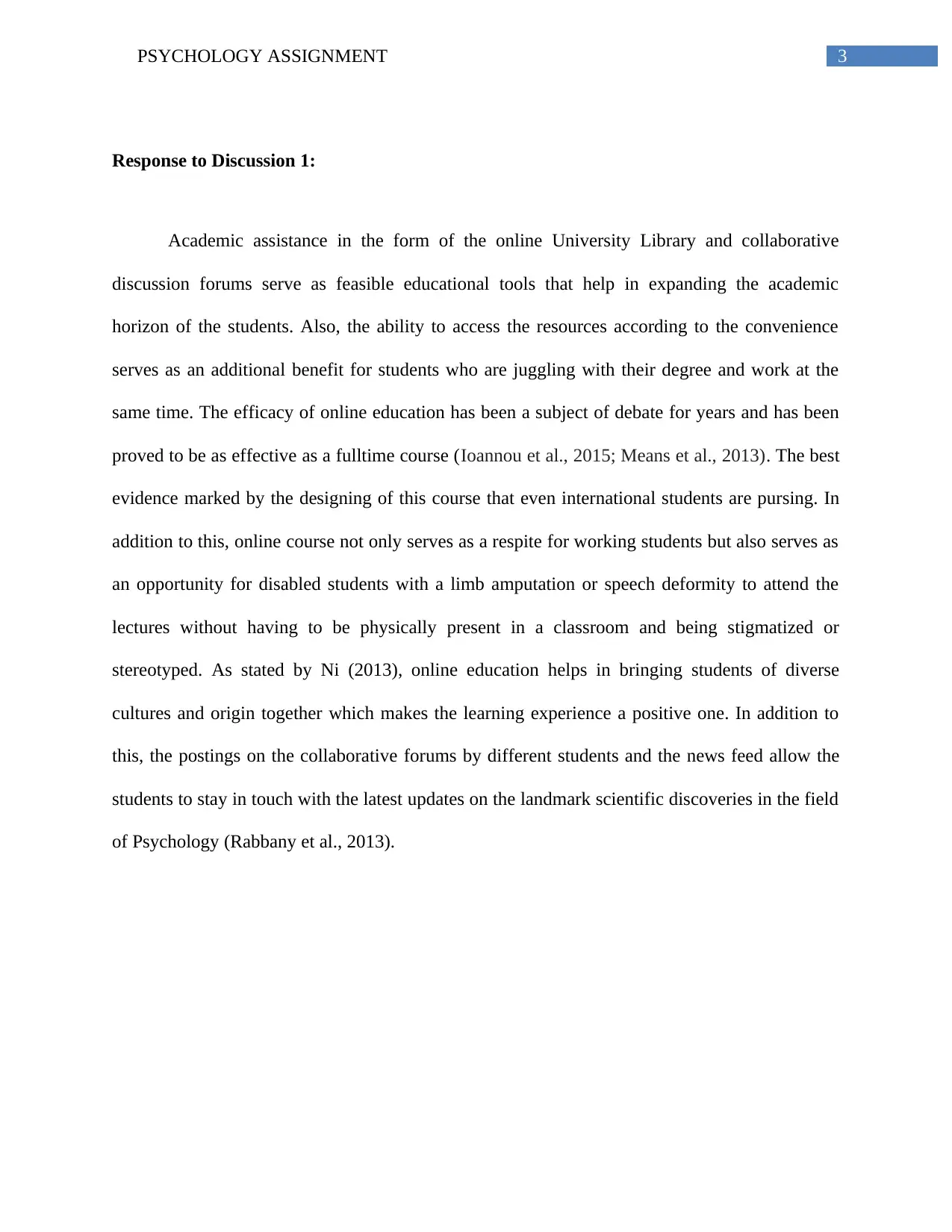
3PSYCHOLOGY ASSIGNMENT
Response to Discussion 1:
Academic assistance in the form of the online University Library and collaborative
discussion forums serve as feasible educational tools that help in expanding the academic
horizon of the students. Also, the ability to access the resources according to the convenience
serves as an additional benefit for students who are juggling with their degree and work at the
same time. The efficacy of online education has been a subject of debate for years and has been
proved to be as effective as a fulltime course (Ioannou et al., 2015; Means et al., 2013). The best
evidence marked by the designing of this course that even international students are pursing. In
addition to this, online course not only serves as a respite for working students but also serves as
an opportunity for disabled students with a limb amputation or speech deformity to attend the
lectures without having to be physically present in a classroom and being stigmatized or
stereotyped. As stated by Ni (2013), online education helps in bringing students of diverse
cultures and origin together which makes the learning experience a positive one. In addition to
this, the postings on the collaborative forums by different students and the news feed allow the
students to stay in touch with the latest updates on the landmark scientific discoveries in the field
of Psychology (Rabbany et al., 2013).
Response to Discussion 1:
Academic assistance in the form of the online University Library and collaborative
discussion forums serve as feasible educational tools that help in expanding the academic
horizon of the students. Also, the ability to access the resources according to the convenience
serves as an additional benefit for students who are juggling with their degree and work at the
same time. The efficacy of online education has been a subject of debate for years and has been
proved to be as effective as a fulltime course (Ioannou et al., 2015; Means et al., 2013). The best
evidence marked by the designing of this course that even international students are pursing. In
addition to this, online course not only serves as a respite for working students but also serves as
an opportunity for disabled students with a limb amputation or speech deformity to attend the
lectures without having to be physically present in a classroom and being stigmatized or
stereotyped. As stated by Ni (2013), online education helps in bringing students of diverse
cultures and origin together which makes the learning experience a positive one. In addition to
this, the postings on the collaborative forums by different students and the news feed allow the
students to stay in touch with the latest updates on the landmark scientific discoveries in the field
of Psychology (Rabbany et al., 2013).
Paraphrase This Document
Need a fresh take? Get an instant paraphrase of this document with our AI Paraphraser
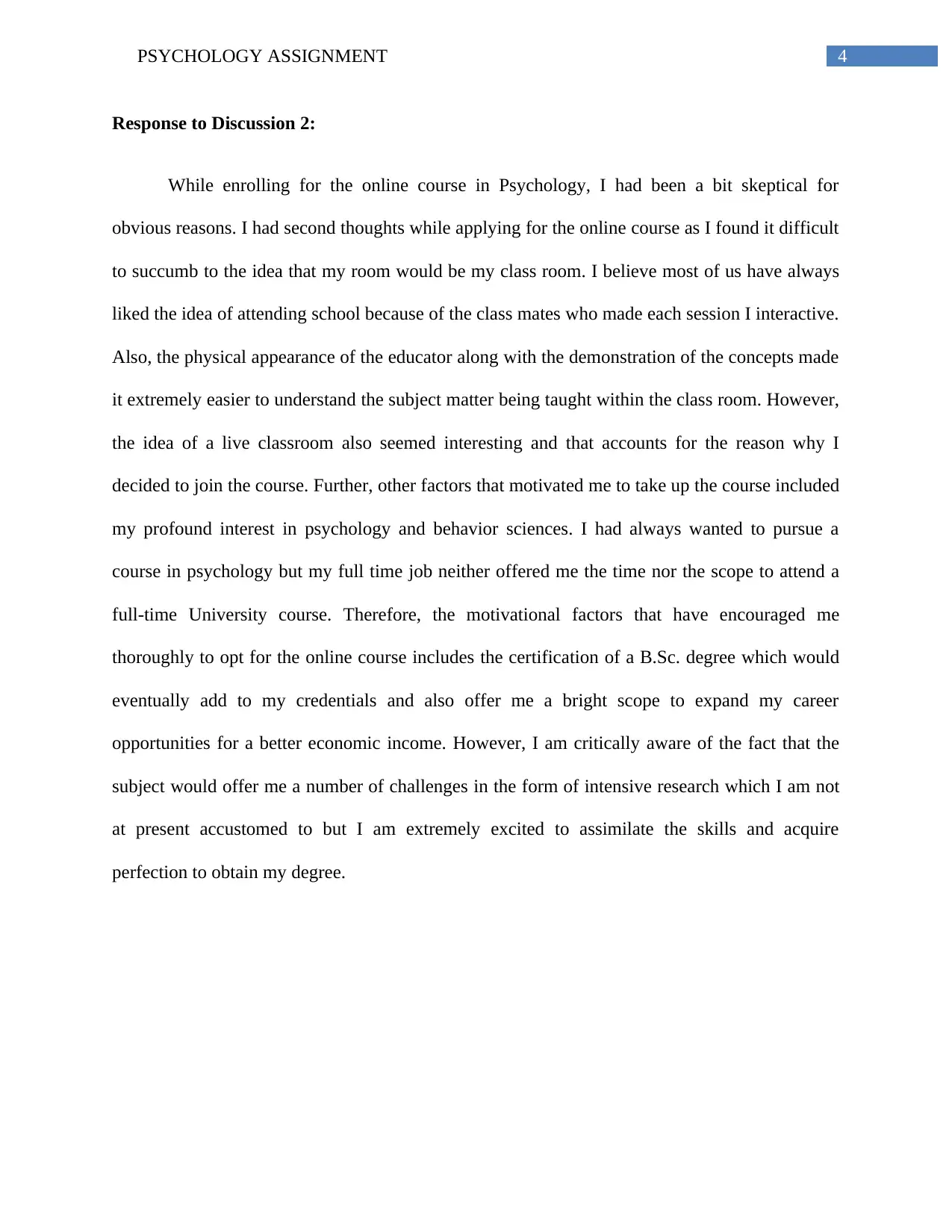
4PSYCHOLOGY ASSIGNMENT
Response to Discussion 2:
While enrolling for the online course in Psychology, I had been a bit skeptical for
obvious reasons. I had second thoughts while applying for the online course as I found it difficult
to succumb to the idea that my room would be my class room. I believe most of us have always
liked the idea of attending school because of the class mates who made each session I interactive.
Also, the physical appearance of the educator along with the demonstration of the concepts made
it extremely easier to understand the subject matter being taught within the class room. However,
the idea of a live classroom also seemed interesting and that accounts for the reason why I
decided to join the course. Further, other factors that motivated me to take up the course included
my profound interest in psychology and behavior sciences. I had always wanted to pursue a
course in psychology but my full time job neither offered me the time nor the scope to attend a
full-time University course. Therefore, the motivational factors that have encouraged me
thoroughly to opt for the online course includes the certification of a B.Sc. degree which would
eventually add to my credentials and also offer me a bright scope to expand my career
opportunities for a better economic income. However, I am critically aware of the fact that the
subject would offer me a number of challenges in the form of intensive research which I am not
at present accustomed to but I am extremely excited to assimilate the skills and acquire
perfection to obtain my degree.
Response to Discussion 2:
While enrolling for the online course in Psychology, I had been a bit skeptical for
obvious reasons. I had second thoughts while applying for the online course as I found it difficult
to succumb to the idea that my room would be my class room. I believe most of us have always
liked the idea of attending school because of the class mates who made each session I interactive.
Also, the physical appearance of the educator along with the demonstration of the concepts made
it extremely easier to understand the subject matter being taught within the class room. However,
the idea of a live classroom also seemed interesting and that accounts for the reason why I
decided to join the course. Further, other factors that motivated me to take up the course included
my profound interest in psychology and behavior sciences. I had always wanted to pursue a
course in psychology but my full time job neither offered me the time nor the scope to attend a
full-time University course. Therefore, the motivational factors that have encouraged me
thoroughly to opt for the online course includes the certification of a B.Sc. degree which would
eventually add to my credentials and also offer me a bright scope to expand my career
opportunities for a better economic income. However, I am critically aware of the fact that the
subject would offer me a number of challenges in the form of intensive research which I am not
at present accustomed to but I am extremely excited to assimilate the skills and acquire
perfection to obtain my degree.
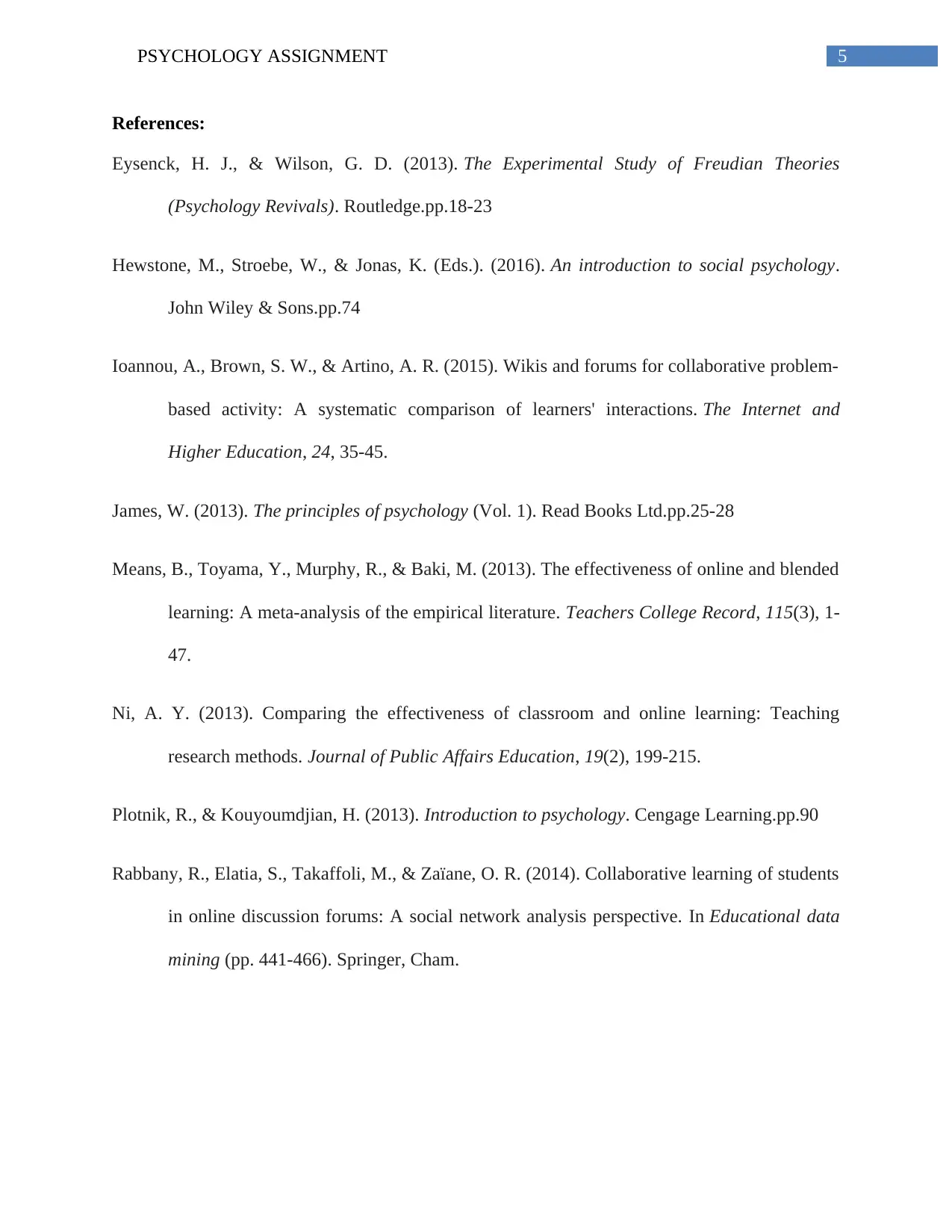
5PSYCHOLOGY ASSIGNMENT
References:
Eysenck, H. J., & Wilson, G. D. (2013). The Experimental Study of Freudian Theories
(Psychology Revivals). Routledge.pp.18-23
Hewstone, M., Stroebe, W., & Jonas, K. (Eds.). (2016). An introduction to social psychology.
John Wiley & Sons.pp.74
Ioannou, A., Brown, S. W., & Artino, A. R. (2015). Wikis and forums for collaborative problem-
based activity: A systematic comparison of learners' interactions. The Internet and
Higher Education, 24, 35-45.
James, W. (2013). The principles of psychology (Vol. 1). Read Books Ltd.pp.25-28
Means, B., Toyama, Y., Murphy, R., & Baki, M. (2013). The effectiveness of online and blended
learning: A meta-analysis of the empirical literature. Teachers College Record, 115(3), 1-
47.
Ni, A. Y. (2013). Comparing the effectiveness of classroom and online learning: Teaching
research methods. Journal of Public Affairs Education, 19(2), 199-215.
Plotnik, R., & Kouyoumdjian, H. (2013). Introduction to psychology. Cengage Learning.pp.90
Rabbany, R., Elatia, S., Takaffoli, M., & Zaïane, O. R. (2014). Collaborative learning of students
in online discussion forums: A social network analysis perspective. In Educational data
mining (pp. 441-466). Springer, Cham.
References:
Eysenck, H. J., & Wilson, G. D. (2013). The Experimental Study of Freudian Theories
(Psychology Revivals). Routledge.pp.18-23
Hewstone, M., Stroebe, W., & Jonas, K. (Eds.). (2016). An introduction to social psychology.
John Wiley & Sons.pp.74
Ioannou, A., Brown, S. W., & Artino, A. R. (2015). Wikis and forums for collaborative problem-
based activity: A systematic comparison of learners' interactions. The Internet and
Higher Education, 24, 35-45.
James, W. (2013). The principles of psychology (Vol. 1). Read Books Ltd.pp.25-28
Means, B., Toyama, Y., Murphy, R., & Baki, M. (2013). The effectiveness of online and blended
learning: A meta-analysis of the empirical literature. Teachers College Record, 115(3), 1-
47.
Ni, A. Y. (2013). Comparing the effectiveness of classroom and online learning: Teaching
research methods. Journal of Public Affairs Education, 19(2), 199-215.
Plotnik, R., & Kouyoumdjian, H. (2013). Introduction to psychology. Cengage Learning.pp.90
Rabbany, R., Elatia, S., Takaffoli, M., & Zaïane, O. R. (2014). Collaborative learning of students
in online discussion forums: A social network analysis perspective. In Educational data
mining (pp. 441-466). Springer, Cham.
⊘ This is a preview!⊘
Do you want full access?
Subscribe today to unlock all pages.

Trusted by 1+ million students worldwide
1 out of 6
Related Documents
Your All-in-One AI-Powered Toolkit for Academic Success.
+13062052269
info@desklib.com
Available 24*7 on WhatsApp / Email
![[object Object]](/_next/static/media/star-bottom.7253800d.svg)
Unlock your academic potential
Copyright © 2020–2025 A2Z Services. All Rights Reserved. Developed and managed by ZUCOL.





